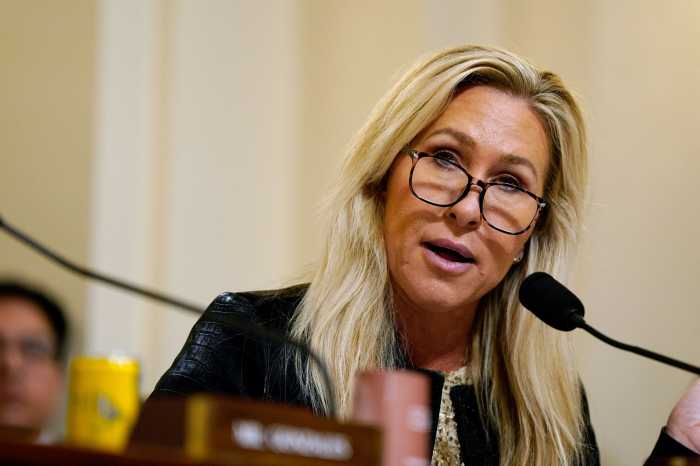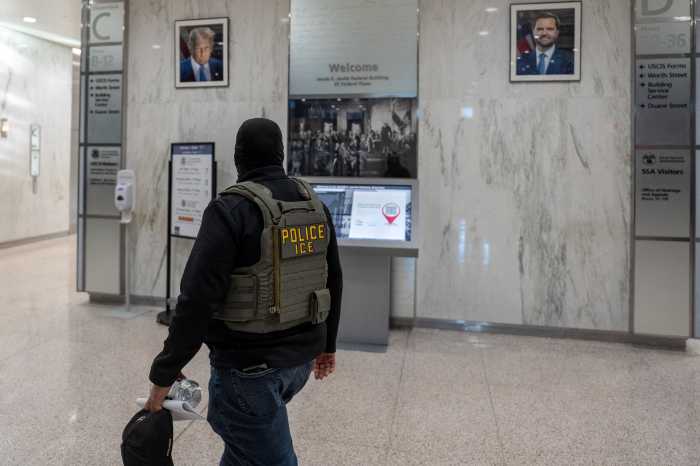As the peace marchers gather in Washington this weekend, does the left have an exit plan?
The Beltway cognoscenti appears trapped between two bad choices––unilateral withdrawal or staying until victory.
A third choice is offered by Gareth Porter, a longtime critic of U.S. foreign policy, a former advisor to Jesse Jackson, and a contributor to antiwar.com. He focuses, as everyone does, on the growing violence between Sunni and Shiite, but argues it is a mistake to place all the blame on the Sunnis by claiming they are anti-Democratic terrorists. The majority Shiites admire Iran and are “no strangers to using violence for political purposes,” Porter has written. By supporting the Shiites and fighting the Sunnis, the U.S. hinders reconciliation and intensifies the “slide” into civil war.
The objective of U.S. policy should shift from defeating the Sunni-based insurgency to preventing the growth of the sectarian civil war. News stories about Iraqi police being killed are almost always a case of Sunnis killing Shiite partisans. Only rarely do news stories reveal that the Shiites are attackers usually wearing government uniforms. The New York Times senior correspondent in Iraq, John Burns, reported on July 24, 2005 “There have been persistent reports, mostly in Baghdad, of Shiite death squads in police uniforms abducting, torturing and killing Sunni Arab clerics, community leaders, and others.” A Sunni leader told him the Iraqi army trained by the United States “does not come to serve” the Sunni “but to punish them. The people hate them.” For the government to work, these sectarian differences must be resolved politically and peacefully.
The United States has a huge bargaining chip that should be used to force Sunni and Shiite leaders to compromise and create a central government that can preserve the peace. The presence of the U.S. troops, Porter declared in Middle East Policy, a quarterly journal, “can draw the Shiites and Sunnis into serious negotiations on a comprehensive settlement of political and military issues, or, failing that, to negotiate a military settlement with the leaders of the Sunni insurgency.”
The first step is to respond positively to Sunni peace feelers. The Shiites who now control the government should be told that they must begin negotiations. Should the Shiites balk and resist compromises with the Sunnis, the U.S. can start negotiating troop withdrawals with the Sunnis. The possibility of cutting a separate deal with the insurgents for the withdrawal of U.S. troops provides this country with the leverage to persuade the Shiites that compromise is the best way. And of course, democratic governments require leaders willing to compromise.
Such a deal would be attractive to Sunnis because it offers amnesty; in return the United States can press its interest in the destruction of the foreign jihadists with ties to Al Qaeda and yet another Muslim sect, the Wahabi, led by Abu Musab al-Zarqawi and responsible for many of the attacks on U.S. troops. The United State has placed an award of $25 million for the capture of al-Zarqawi.
A second great strategic interest of the United States is keeping Iraq independent of Iran. A government run by the Kurds, Sunnis, and Shiites in combination is more likely to purse this foreign policy than a government controlled simply by the Shiites.
Porter is proposing that the United States adopt an even-handed view of all the Iraqi groups except for the foreign jihadists and Al Qaeda. Given the history of violence and the absence of democratic traditions, the response of the Iraqis to such an initiative is unpredictable. But an even-handed policy will be well received by the rest of the world and align the United States with moderate Arab opinion. These are major pluses.
Washington’s current definition of the war as a battle between a democratic government ––run by the Shiites and the Kurds––against the forces of terrorism, defined by Sunni aspirations, is a fiction. The Sunnis are fighting a foreign occupation and the threat to their life and liberty posed by a Shiite-controlled government. Their ties to Al Qaeda are simply marriages of convenience, Porter argues; when the Wahabi group has taken control of Iraqi cities and towns, its strict religious rules have enraged the Sunnis. For an even-handed policy aimed at curbing the incipient civil war to succeed, Washington must abandon its belief that the Sunnis and Al Qaeda are joined at the hip. Porter maintains that the Sunnis would definitely jettison the jihadists given the tactical opportunity.
Porter’s proposal differs from the view prevailing among Washington policy makers in its emphasis on a strong central government. Washington hopes that by giving the Kurds, Sunnis, and Shiites a large degree of autonomy group conflict will lessen. Porter argues that only a strong government can prevent disputes from disintegrating into violence. This is particularly true in Baghdad where millions of Sunnis and Shiites live in the same city.
Iraq is dependent on its oil exports. The oil fields are in Kurdish and Shiite territory. The Sunnis have little or no oil where they live. Porter argues that only a strong government can retain control of oil revenues and distribute them in Baghdad and throughout the rest of nation. Too much government decentralization would lead to oil revenues staying in their local region while leaving the cities and Sunni territories short of cash.
Porter’s proposals are a serious contribution to the debate over an exit strategy. They deserve a fair and open appraisal by foreign policy experts and Congress. In an ideal world, the growing public disenchantment with the war in Iraq and the recognition that Bush’s description of the war as a battle between international terrorism and democracy represents a false choice should produce a serious debate. Unfortunately, images and propaganda dominate politics and it looks as though Congress continues to support the president.
gaycitynews.com




































